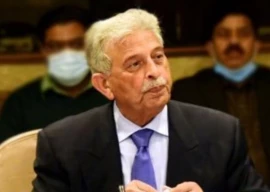
In truth, Nadhim has been a party member for decades. “I became an activist in the fundamental years of Margaret Thatcher,” he says, referring to the former prime minister’s privatisation programme and epic battles with the unions.
It’s a similar situation now: the Conservatives have embarked on a massive reform agenda. Nadhim points out areas such as education, energy and welfare, where his party “are seen to be much more in tune with where the nation is at.”
This may be true in some quarters, but in others the cuts to public spending have drawn furious indignation. Nadhim defends his party’s tough decisions, even keeping a portrait of Thatcher above his desk, “to remind me how radical she had to be to get this country working again.”
Some have accused the government of doing too much too quickly. “One thing you learn about this business is that it’s such a massive machine,” he says, looking around the large atrium, where a few tables away the former foreign secretary David Miliband is chatting amiably. “The momentum that you have as the new government … you really have to try and drive through as much of your agenda as you can. Otherwise you are pulled back down by the inertia of the machine.
Further afield, Iraq still holds a passionate place in his heart (his parents are Kurdish and he was born in Baghdad). Although Nadhim stresses that he doesn’t speak for the foreign office, he takes a firm yet long-term view on politics in the region.
“It’s important to send a clear message to those who believe in the rules of democracy, i.e. that when you’re elected, you’re elected on a manifesto, and if you don't deliver and are voted out, you need to let someone else have a go.
"We are on the side of those parties that want to enhance and grow democratic institutions – the judiciary, an independent media, the rule of law, the whole thing. We will absolutely stand against those parties who use democracy to subvert the process, those who use democracy to destroy it.”
His perspective, it seems, is grounded in a study of history and also an awareness of the ground realities: both that the energy of the Arab Spring needs legitimate outlets, and that religious parties are unavoidable in the short term.
“The popes 500 years ago ruled Europe with an iron fist in a velvet glove. The same thing is happening in parts of the Middle East.
“Initially, people who aren’t used to using the ballot box to change their community and their country will vote for the person they think can protect them or put food on the table. We’re going to have to take a very long view on this. It took us 713 years go from the Magna Carta to having a fully functional democracy in this country, in 1928. I don’t think it will take the region 713 years but it will take a while.”
Back home, he clearly enjoys the buzz of Westminster and says he still pinches himself when walking its halls. “I just hope I can do some good,” he says, but what are his political ambitions?
“I'd like to be famous for being the secretary of state for Stratford-on-Avon.” This seems to be his priority, with his business career largely on hold. When Parliament sits, Nadhim spends Monday to Thursday in London. On Friday he travels to his constituency to meet the people he represents, returning to the capital on Monday morning.
In the House of Commons, he sits a few rows back from the Prime Minister, right next to Father of the House, Sir Peter Tapsell, who was a junior speechwriter for Winston Churchill and has been a great friend, raconteur and guide for the ‘new boy’ MP. Will Nadhim one day edge closer to the despatch box, as part of the cabinet or perhaps even in the main job itself? It’s early days, but as he says his goodbyes with the warm handshake possessed by those with the natural touch for politics, one can say one thing for sure: Nadhim Zahawi is one to watch. Remember the name – and learn how to pronounce it.
Part 1 can be read here.
































1714024018-0/ModiLara-(1)1714024018-0-270x192.webp)









COMMENTS
Comments are moderated and generally will be posted if they are on-topic and not abusive.
For more information, please see our Comments FAQ